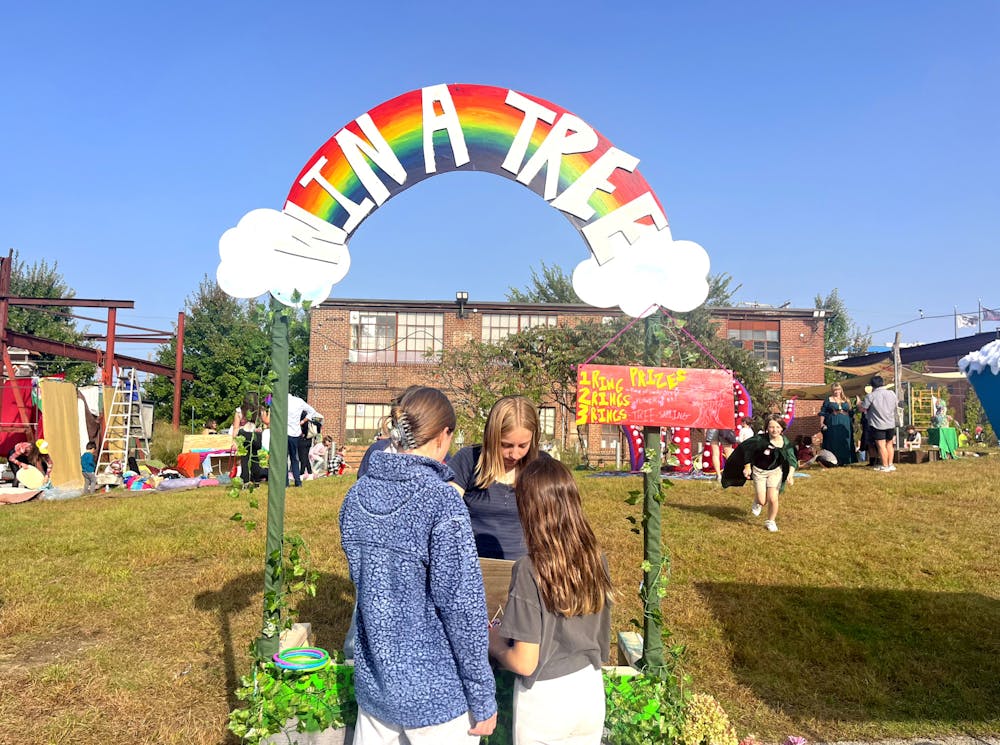This Sunday, Providence’s participatory art carnival Wooly Fair returned for the first time since 2013. This year’s rendition, Wooly Fair 2023: Big Deal, featured many performers and 22 interactive games and art installations, and was held at the Steel Yard in Providence. Artists Sam White and David Allyn produced the event in collaboration with the Nicholson File Art Studios.
Attendees were encouraged to “wool up!” and dress in fun, extravagant costumes, according to the fair’s website. Each attendee was given a random name tag and new identity as they entered the event. Abby Phillips, an event coordinator for Wooly Fair, said “We come in, we give out name tags, we give you a new identity … So, you come in, you live your anonymous life, you let loose, you get vulnerable, you shake your butt and you have a good time.”
“The idea is that anybody who walks in and enters a participatory art carnival is not just a spectator but a part of the fair,” she added. “You’re here to be a part of it, and feel welcome and Wooly.”
According to the event’s press materials, Wooly Fair originated in 2005 as a backyard talent show at the Steel Yard. Up until 2013, the fair returned every year with new installations and performances, drawing in more members of the local community.
Wooly Fair “celebrates the human impulse to make a place from your imagination with your own hands, make it with friends and then throw a party inside it,” according to its website. The event serves as an outlet for artists to explore outside the sphere of their usual artwork, and for “artists-at-heart” to contribute and interact with the unique installations the artists create.
Artist Michael Townsend, a Wooly Fair veteran, said the invitation to participate is always to “come and make whatever it is you want to make.” According to Townsend, “over the years that has escalated in absurdity and danger.”
He added that such freedom to create “allowed myself and my art collaborators to make some truly memorable pieces.” His installation this year represents a “soft reflection on celebrating death,” he said. “We did about a thousand little tiny drawings of gravestones with coffins underneath them on boulders of tape that are on the ground. The very simple invitation in this installation is to walk through a coffin shape surrounded by an entire cemetery of very peaceful grave scenes.”
According to Phillips, the event “grew beyond the capacity of” founder Sam White, leading to the decade-long hiatus.“He needed to take a break … and he had to put his focus elsewhere,” she explained.
But this year, Phillips said, “we started planning well in advance and we have multiple people involved, and so we’re trying to build a better foundation for the event so that now if it grows, we’re able to sustain it.”
Wooly Fair sponsors include Narragansett Brewery, the Fakhouri Fund and the Rhode Island State Council for the Arts, which awarded this year’s event with a Community Engagement Grant.
For Annaliese Ritterhaus Neff and Dan Neff, the return of Wooly Fair not only represented “fun times and costumes,” but also a celebration of their wedding anniversary. “We also got married at the Steel Yard, and yesterday was our anniversary, so we were like, ‘Oh, Wooly Fair on our wedding anniversary? Let’s do it,’” Ritterhaus Neff added.
This year also marked Ritterhaus Neff’s first Wooly Fair, where she showcased her art installation “the Kraken Wranglers.” The idea for the piece, she explained, came from the ring toss game — her version, though, features huge tentacles.
Phillips highlighted a stained-glass pagoda near the entrance of the festival. “This pagoda,” she explained, “is from 10 years ago. So we’ve left our mark here. It’s nice to be back.”

Tom Li is the editor-in-chief and president of The Herald's 135th editorial board. He is from Pleasanton, California and studies economics and international and public affairs. He previously served as a metro editor, covering the Health & Environment and Development & Infrastructure beats, and has worked on The Herald's copy editing, editorial page board, design and podcast teams.





